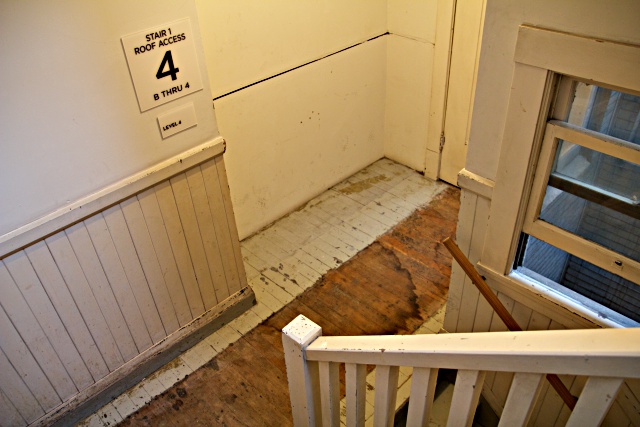
Fe Soledad’s day begins with making sure her son Vincent is ready to go to school before she heads off to work. Everything needs to be laid out carefully; she speaks in a calm reassuring voice as they talk about Vincent’s plan for the day. She is his sounding board, companion, and his most diligent advocate.
So when she moved into a shared one-bedroom apartment at 634 Powell in September of 2015, she immediately noticed something was wrong. Vincent was very sick. “I could see he was suffering and in pain,” she said.
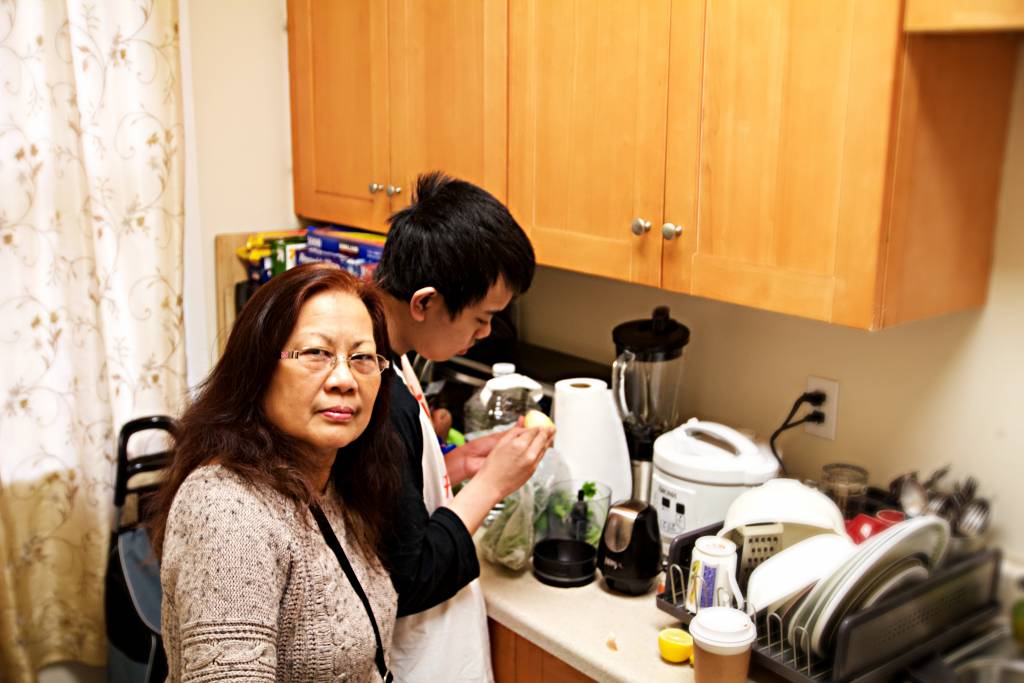
Vincent, 18, was having trouble breathing. “He’s severely autistic and actually he doesn’t know how to cough so when I noticed that he was coughing differently I said to myself something is really wrong here,” Fe said. It wasn’t long before her roommate Vivianne (last name withheld upon request) began falling sick too.
This is a story of how a determined mother and her neighbors are fighting for decent living conditions in a building that gives the impression of a well-manicured complex — but tenants complain that from the inside it’s riddled with mold, rusty pipes, lead-contaminated water, and unreliable electricity.
The building is now owned by Veritas, one of the city’s largest landlords. CEO Yat-Pang Au, who started off with just a couple of buildings, managed in 2013, with a mortgage of $685 million, to buy out the troubled assets of Skyline Realty. The company now owns more than 200 buildings with 5,000 units.
Veritas didn’t own the Powell Street building when Soledad moved in. At that point, the landlord was Ronald Tong, who owns several other properties in the city.
It didn’t take long for Soledad to suspect that a moldy ceiling might be to blame for her son’s health problems. She decided to inform the building management but to no avail.
Mold is no joke. The Centers for Disease Control and Prevention (CDC) states that “Exposure to damp and moldy environments may cause a variety of health effects or none at all” the list of health effects range from “nasal stuffiness, throat irritation, coughing or wheezing, eye irritation, or, in some cases, skin irritation” to mold allergies that can cause more severe lung infections.
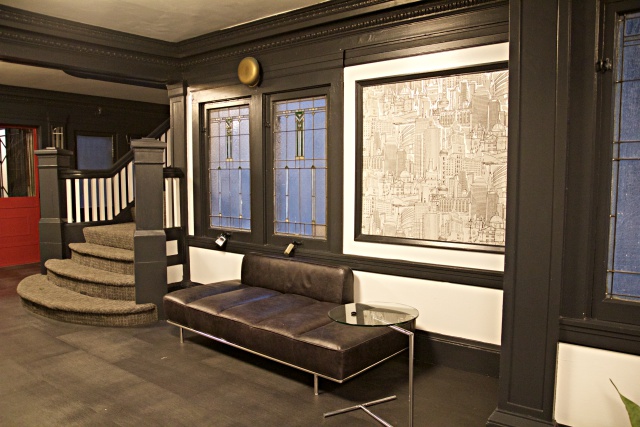
After a year of dealing with health issues, Soledad learned that the apartment building was being sold and hoped that meant repairs were in order. “When architects and engineers came to check the building, the old management just stuck glue and plastered the wall because there was a lot of mold on the ceiling,” Soledad scoffs. “It was like the bathroom ceiling was falling but they glued it and painted the area. We had such terrible headaches after that like our heads were gonna blast”.
Property records show Veritas bought the building in September 2016, for $13.375 million. Actually, Veritas never appears on the deed; the property was technically purchased by 634 Powell 15 LLC. That’s owned by by VIC Strategic Multifamily Partners, documents on file with the state show.
But Au’s name is on the Delaware corporate filings for VIC.
A notice issued in October 2016 by Greentree, a property management company owned by Veritas, let residents know that there would likely be work done, and that they would be given 24-hour notice before an agent entered their apartments “to exhibit the premises to prospective or actual purchasers, mortgages, tenants, workers or contractors”.

Between working a graveyard shift at Subway and being Vincent’s in-house caretaker, Soledad became increasingly stressed out about their well-being. Frustrated, she reached out to her neighbors: “I told everyone what they are doing here is just makeup. Like, face make-up to make you beautiful to make this presentable to new tenants. That’s a big no-no for me because the very issues here are the old pipes, the water supply, our living condition, sanitation and the electricity,” she said as she pointed to her bedroom wall behind the kitchen. “This used to be a busted one, we don’t have light here for so many months. I didn’t have light in my room for eight months.”
Property records show dozens of complaints filed with Department of Building Inspection dating back to 1995, ranging from rusty pipes to exposed electrical wiring. Many of these complaints were made before Veritas bought the building but tenants complain Veritas hasn’t made repairs a priority.
And some of the complaints have been filed since Veritas took over, including a complaint that alleges apartments were used as illegal short-term rentals.
According to one complaint, which remains open: “Multiple complaints of illegal short-term rental activity possibly operated by Greentree Property Management / RentSFNow offering stays of less than 30 days in multiple units (e.g. Unit 36, Unit 46). Similar to complaints received at other similarly managed properties in NE of City.”
Veritas and Airbnb announced a partnership in November last year to boost “short-term rentals” in San Francisco. As reported by Cnet “As for Veritas, it will initially let tenants in five of its buildings list their apartments on Airbnb. The landlord will get 10 percent of that short-term rental profit and said it will put some of the money back into the building for upgrades and program oversight. Veritas owns more than 200 buildings in San Francisco.”
We contacted Airbnb for comment but didn’t receive a response.
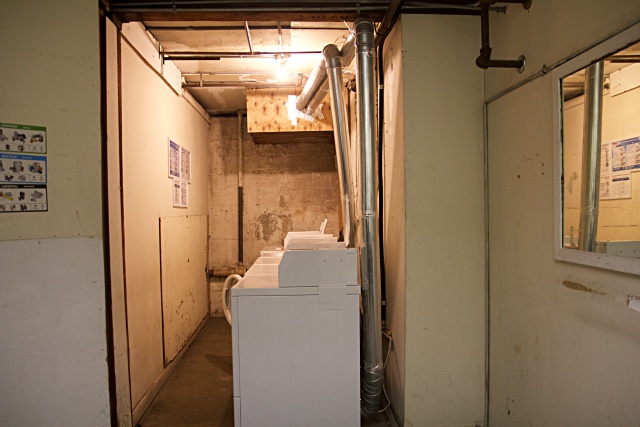
There have been more than 60 complaints filed with the Department of Building Inspection in 2017 alone, including broken elevators, illegal electrical work being done without permits (“the wiring looks scary, the complainant wrote), no heat, broken water pipes, and more.
Ron Heckmann, spokesman for Veritas, says the company now faces the challenge of repairing a building that had been “neglected for many years by the prior owner,” and that Veritas “has been actively addressing things while trying to minimize construction and impact on the residents, including but not limited to electrical, roofing and other matter. Asbestos that we’ve encountered has been fully abated, in cooperation with City inspectors” he said in an email response to 48hills.
Veritas is in many ways a remarkable business story. Using both traditional mortgages and Wall-Street-backed investments, Au has become by some accounts the biggest residential property owner in San Francisco. He’s won plaudits in some circles: The Board of Supervisors gave Veritas an award in 2015 for allowing tenants displaced by fires to move in to short-term “good samaritan” leases while their original units were being repaired.
But Veritas’ plans include substantive renovations of existing units and, according to a 2016 Standard & Poors analysis of a $349 million mortgage-security investment that the company was seeking, Veritas expects to make money by charging higher rents for vacant units.
“The portfolio has approximately $23.0 million in potential rent that is currently not being captured on in-place leases as the properties in the portfolio are subject to San Francisco’s rent control guidelines. The rent control guidelines restrict a landlord from raising a renewing tenant’s lease by more than 60% of the city’s consumer price index (CPI). However, the sponsor’s ability to renovate units that become vacant could allow them to capture some of this upside. The sponsor has funded an upfront reserve of $19.0 million to fund these renovation costs.”
According to a 2013 Securities and Exchange Commission document based on filings from Veritas, the company “has achieved an annual turnover of 30.7 percent of total units.” That means 30 percent of the tenants left over an 18-month period.
Heckmann says that the company never seeks to evict low-rent tenants without cause. When we asked how many tenants had been paid to leave, he said the company would not provide that information.
In the case of 634 Powell, Veritas soon after the purchase began doing some renovations like scraping paint from the building’s exterior, repainting the exterior and re-decorating the reception area with new couches, wallpaper, and paint.
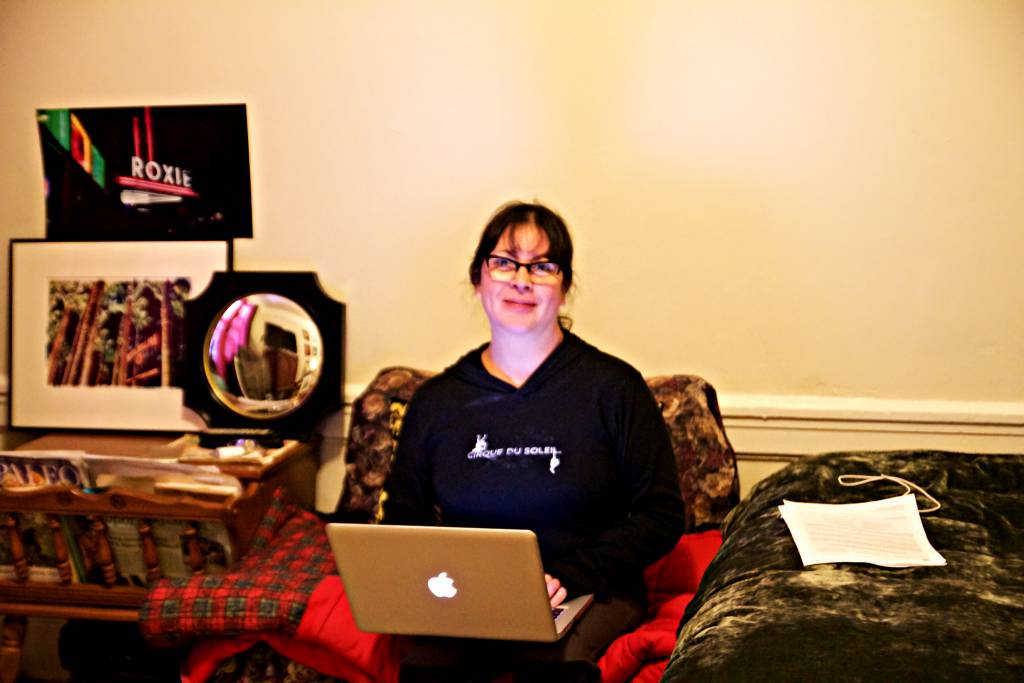
But long-term maintenance issues in the living units remain a problem.
Soledad is seated in her cozy kitchen with her neighbor, Lenea Maibaum, a photographer who has lived in the building for 22 years. They have been keeping each other informed of new developments in the building.
Maibaum prompts occasionally to remind Soledad about the issues they have faced in the past two years: “I have been here for over 20 years, but last two years have definitely gotten worse. There’s no accountability for any complaints. Its as if the new management wants to force us out of our homes so they can charge higher rents,” Maibaum told 48hills.
Their most pressing concern is the lead in their water supply. A test conducted by San Francisco’s Water Quality Division revealed “37 µg/L of lead.” The report issued on December 12, 2017 notes that “EPA’s action level for lead is 15 µg/L or parts per billion (ppb) or more,” and that the sample tested ” revealed a level of lead that exceeds the action level. The source of lead may be in your water faucet, the pipes in your home, or the solder that connects the pipes. There is no known lead in the SFPUC’s distribution pipes or water meters” the letter states.
This deeply troubles Soledad who is concerned about the impact it could have on Vincent’s health. According to the CDC, exposure to lead can seriously harm a child’s health including damage to the brain and nervous system, slowed growth and development, learning and behavioral problems and hearing and speech problems.
“We always felt that there was something wrong with the water supply here, we’d see large black things in the water in our sink. A lot of times the water would look rusty and yellow,” Maibaum said as she pulls a photo from her iPad showing black residue in a sink and a blurry video showing rusty water from the tap “I have so many pictures, we have so many videos of the dirty water we are forced to live with here and whenever we asked we were told there are no issues.”

In fact, it wasn’t until another determined neighbor, Amina Rubio took it upon herself to get the water tested that their doubts were finally confirmed on paper.
Rubio has lived in the building for 25 years. Even before hearing her story you can sense she commands attention. She is fierce, thorough, and relentless. She’s a professional opera singer who was raised in Modesto and worked as a hairdresser in San Francisco until she had a medical condition that left her paralyzed.
“I couldn’t move, I couldn’t walk, I taught myself everything from scratch, I pushed myself every single day to just keep going. Little by little, I did it. I taught my body how to be again, but I am here, I am strong and I am not going to be pushed out.” Rubio says that experience taught her not to give up — so she’s been standing up for herself and for others “Quite literally” she quips.
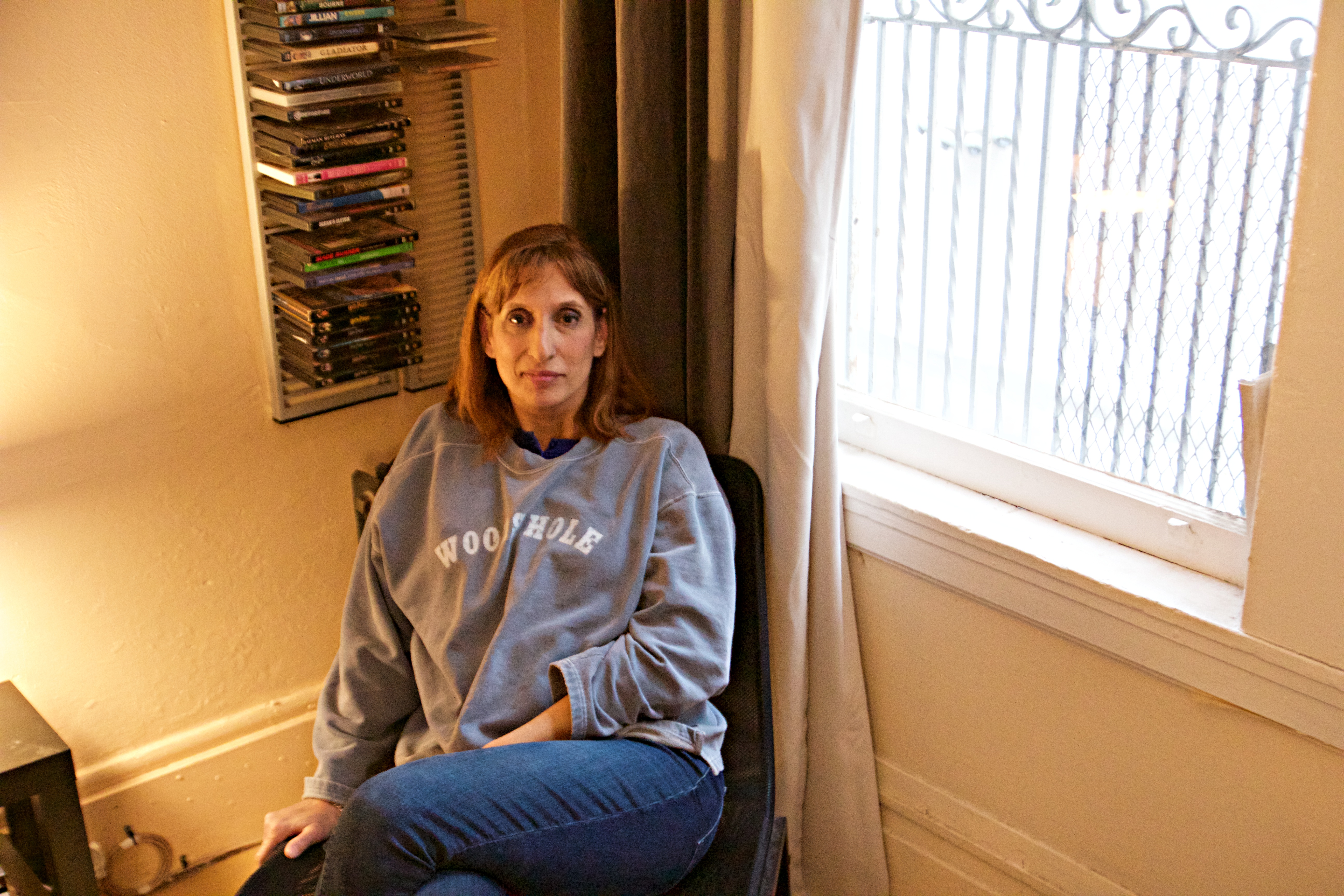
Rubio has a knack for learning; she volunteers for the Housing Rights Committee an organization that works for renters right across the city, and she’s not shy about sharing her knowledge.
It was water from her kitchen faucet that revealed an actionable level of lead. As soon as she got the results she began informing her neighbors. Soledad says if it wasn’t for Rubio she and others would have never known that the water in their building was unsafe for consumption.
Soon after she complained, a notice was posted in building’s foyer informing residents about an “emergency water shut off” without any explanation of what prompted the action. Another note on top said, “please feel free to take a gallon of water for your use.” In the absence of any information from Veritas and Greentree, Rubio says she took it upon herself to inform tenants in the building, she made phone calls and distributed flyers.
Heckmann denies the claims and says that “Residents have been fully informed of the water issue including most recently a Jan. 5 letter summarizing the situation and alerting them to plans for replacing faucets. All sink faucets in the building have been replaced, as of last week.” A notice issued to the tenants on January 9th informed tenants that water supply in their units would be tested.
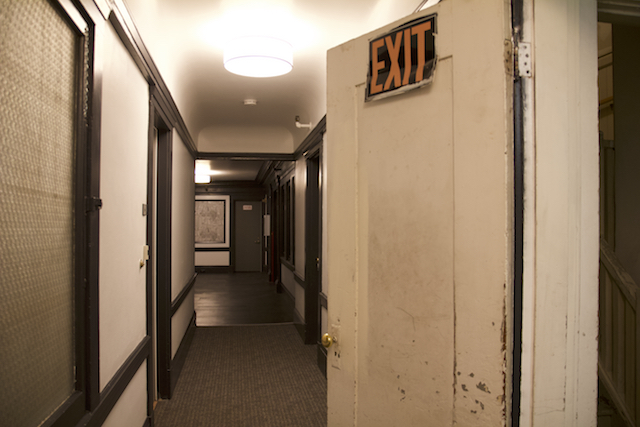
Heckmann reiterated that Veritas took immediate action once they received the test results and are continuing to work with the city “the self-tested results from one of our residents last month were discussed with the City immediately, and we worked with the City in arranging a professional engineer to test the resident’s unit. We went beyond that requirement and tested water in several other units. Those results were below the minimum standards in most cases, while some were elevated, indicating that the problem was most likely the faucets installed by prior owners, so we began replacing all sink faucets. Tests by the water engineering firm will be back either Friday or Monday” he wrote.
48 hills hasn’t seen the results of the tests Heckmann is referring to and will update the story when we receive a copy of the results.
Rubio says the effort to keep Veritas accountable is exhausting. “So I am tired,” she said. “I am just tired and I am not going to let these issues continue. If we don’t push for changes this will only get worse.”
Like Soledad ad Maibaum, Rubio said she fears the cosmetic changes are being made to attract high-paying tenants; the vacant apartments are aesthetically pleasing and now come with more amenities like in-unit washer and dryer. “They are adding these things to the newer apartments without addressing the rusty pipes and plumbing issues here.”
“I have spoken to Veritas employees and they tell me all of these changes are for our own benefit. Really? How is a new couch at the reception for my benefit when I am still getting rusty water filled with lead in my apartment?”
While tenants have complained about habitability issues without much luck, they’ve been handed rent increases. Soledad, Maibaum, and Rubio are all facing 7% rent increases.
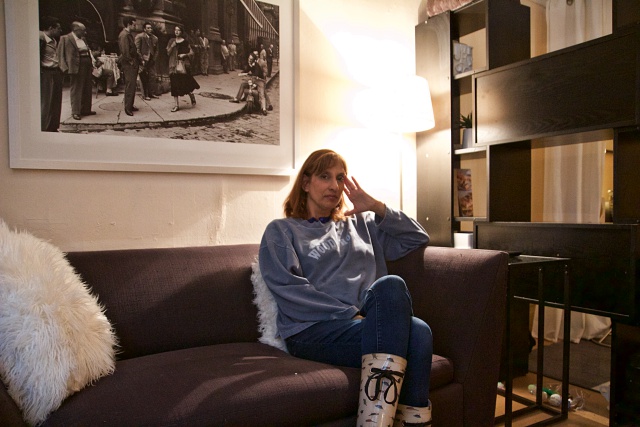
Under the city’s Rent Stabilization Ordinance, annual rent increases are limited to 60 percent of the increase in the Consumer Price Index, which has been running between one and two percent. But if a landlord can prove that “operating and maintenance costs” have increased, rents can go up as much a seven percent.
Here’s how that works at Veritas buildings:
When Veritas bought 634 Powell Street, the company filed a petition with the Rent Board for an increase for all tenants. Among the charges, the company asked to pass along: Property taxes increased from $9,000 to $120,000 a year – an entirely predictable expense linked to the fact that a building that was assessed at a rate set years ago changed hands. And “debt service” – the mortgage on the purchase – went from $119,000 to almost $300,000.
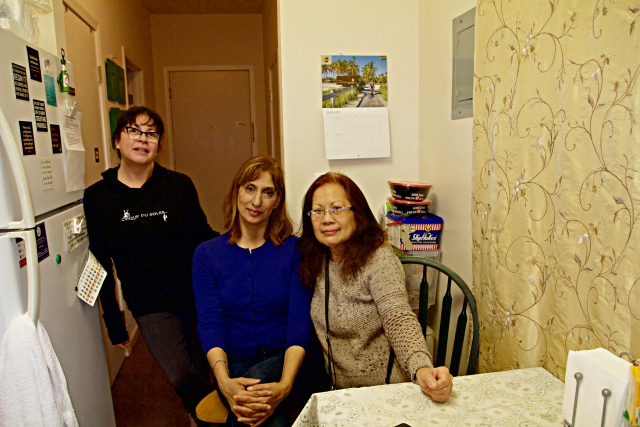
Overall, Veritas asked the Rent Board to approve rent increases of $808 a month to every unit. In effect, the tenants were asked to pay the cost of the mortgage Veritas took out to buy the buildings. In some other Bay Area jurisdictions with rent control, that’s no longer allowed.
“I believe Veritas’ ultimate goal is to get rid of all of us,” Rubio said. Soledad shares her concern.
Rubio’s persistence occasionally pays off, as she often finds out information about repairs ahead of time but says the building management still fails to inform tenants.
Rubio recently learned that Veritas is preparing for electrical repairs in the building — but tenants are unaware of this and haven’t been informed if they’ll face power outages. “This isn’t normal, we can’t even feel at home. When you realize that your apartment is a fire hazard when you realize that you are drinking lead water, when you realize that you can’t go home to a quiet environment, when you realize that your rent is gonna (sic) be raised, where do you find your peace?”



amazing. God bless Amina .she is a strong one.will not make friends with owners but what about fair employment and housing?
I live in the neighbourhood. I became acquainted briefly with Amina Rubio 20 years ago. She showed me her place & told me that she had just spent $1000 out-of-pocket on paint & repairs to her apartment because the (now previous) landlords would do nothing. This 634 Powell Street building now looks like it has deteriorated greatly.
I thought landlords can pass along the cost of improvements to tenants. I believe there is an application process.
Someplace that is not a health hazard.
But then where will the tenants live?
So then the prior owner could have petitioned the rent board to increase rent above the cap to cover some of the maintenance, right? If the landlord taking on a bunch of debt is grounds for an O&M passthrough, surely maintenance costs to fix moldy ceilings, unsafe drinking water, broken elevators, no heat, etc… should be?
Speaking of, the other day on Montgomery St. I saw a top-of-the-line Land Rover with a fake German license plate reading “LEMBI 001.” Charming.
Black mold, lead in pipes, and electrical issues have to be disclosed to the buyer. If not, the buyer can sue the seller. Veritas knew when they bought the building and should have budgeted for making the repairs.
Buy up buildings and fail to maintain them properly. You know as well as I do that the landlord is not not losing money. He is simply not maintaining the building as he should, and if this continues, he should be prosecuted.
Pretty sure the guy bought the buildings with an understanding of rent control.
Egad. This guy is Lembi 2.0
Do what exactly?
Bullshit. Landlords in markets without affordability crises do so every day.
It’s difficult to swallow the corporate greed message here in this article. The one thing tenants who live in rent controlled buildings need to understand is rent control laws cap rent growth to numbers that make it almost unsustainable to keep up with major capital improvements. Hence the reason many less professional landlords delay improvements or put on band aides so they can pass it on to the “next guy”. This puts the purchases of buildings in tight operating budgets unless they can have some level of turnover and get higher market rents. You simply cannot keep up maintenance on a decade+ old buildings with rents that are 20, 40 or 60% below the market. Contractors don’t perform work for 40% below market costs on buildings because it’s rent controlled. Those expenses grow with the rents. This is one of the many inefficiencies of rent control laws. I can’t speak to Veritus’ business model but from what I gather from the article, they’ve been very proactive in making repairs as they’ve come along. They also responded to all inquisitions which is rare. I find this to be a low blow piece that capitalizes on a narrative that pushes SF towards more destructive policies in housing.
Veritas must be the most unlucky investor if it keeps buying buildings with so many repair issues. Or is that their business plan?
If the building is a health hazard it should be shut down and completely renovated. If it is a wealthy corporation they should be able afford it.
Excellent reporting. Really disturbing article. What the heck is the City waiting for?
Good piece. Regarding the water being shut-off:
–You do not need to shut-off the water main to replace faucets. All faucets have their own shut-off valves accessible, as required by code.
–If they are having higher lead levels than neighboring building, then the lead is coming from deterioration of the inside old pipes within the building. Turning the water off will exacerbate the problem. The lead will have a tendency to break loose when the water pressure is re-instated.
Also, the woman with the special needs son should get a lawyer regarding the mold issue. Landlords tremble at the threat of a mold lawsuit. If they are negligent they will be held liable.